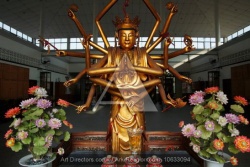Difference between revisions of "Sanctuary"
| Line 21: | Line 21: | ||
| − | [[Sanctuary]] was usually given to those accused of committing what were called ‘the five grave | + | [[Sanctuary]] was usually given to those accused of committing what were called ‘the [[five grave offences]]’ ([[pañcamahaparādha]]), although exactly what constituted these is unclear. |
| − | It might have been breaking the most serious of the [[five Precepts]] or five of the six | + | It might have been breaking the most serious of the [[five Precepts]] or five of the six ‘[[acts of immediate retribution]]’ ([[anantariyakamma]], Miln.25), i.e. murdering one’s mother, one’s father, an [[arahat]], injuring a [[Buddha]] or causing a [[schism]] in the [[Saṅgha]] (As.358). |
| − | In this context injuring a [[Buddha]] was understood to as [[stealing]] or desecrating a [[Buddha]] statue or other [[sacred]] [[objects]]. Other versions of the five grave offences included assault, {{Wiki|killing}} cattle, banditry and rape. | + | In this context injuring a [[Buddha]] was understood to as [[stealing]] or desecrating a [[Buddha]] statue or other [[sacred]] [[objects]]. Other versions of the [[five grave offences]] included assault, {{Wiki|killing}} cattle, banditry and rape. |
Latest revision as of 21:24, 2 January 2024
Sanctuary (abhayaṭṭhāna or pujjaṭṭhāna)is the right of asylum available in certain religious establishments and which is recognized by the government.
Sanctuary in Buddhist monasteries had a long history in Sri Lanka lasting for at least 1000 years.
Royal officers or those who believed a crime had been committed could easily be infuriated, jump to conclusions and dish out swift justice to whoever seemed to be the most likely offender.
This sometimes led to innocent parties being punished. An accused who was able to flee to the nearest monastery would be protected from such mob justice. Sanctuary would give him an opportunity to explain himself and allow his accusers to calm down so that the facts could be more objectively examined.
The monks in the monastery the accused had sought sanctuary in would also be able to adjudicate on the accursed behalf. Numerous documents from ancient Sri Lanka show that royal officers and others were forbidden to enter certain monasteries or sometimes even monastic estates, to apprehend offenders without permission of the monks.
The rules of sanctuary varied at different times and in different places but usually a person was given sanctuary for five days or until the next full moon.
If the monks decided the person seeking refuge was guilty they would expel him or allow royal officers to enter the monastery to arrest him. On other occasions they might negotiate a settlement between the accused and his victim and the judicial authorities.
Sanctuary was usually given to those accused of committing what were called ‘the five grave offences’ (pañcamahaparādha), although exactly what constituted these is unclear.
It might have been breaking the most serious of the five Precepts or five of the six ‘acts of immediate retribution’ (anantariyakamma, Miln.25), i.e. murdering one’s mother, one’s father, an arahat, injuring a Buddha or causing a schism in the Saṅgha (As.358).
In this context injuring a Buddha was understood to as stealing or desecrating a Buddha statue or other sacred objects. Other versions of the five grave offences included assault, killing cattle, banditry and rape.
Violating the right of sanctuary could have very serious consequences for those who did it.
The Mahavaṃsa records an example of this.
During political upheaval in the reign of King Udaya III (934-937) a number of court officials fled to the monastery of some monks revered for their simplicity and holiness.
The king and his soldiers pushed their way into the monastery and summarily executed the officials.
As a protest against this violation of the right of sanctuary and the shedding of blood in their monastery the monks rose in a body and left the capital for the forest.
In response to this protest riots broke out in the capital, sections of the army rebelled and the life of the king himself was threatened. To calm the situation the king had to send his senior ministers after the monks to beg for their forgiveness and plea with them to return to their monastery.
The humiliated and chastened king had to promise never to violate the right of sanctuary again.
There is nothing in the Tipiṭaka addressing the matter of sanctuary in monasteries although it is may have evolved from a general respect for the Saṅgha and the Buddha’s teaching allotting punishment with compassion.
